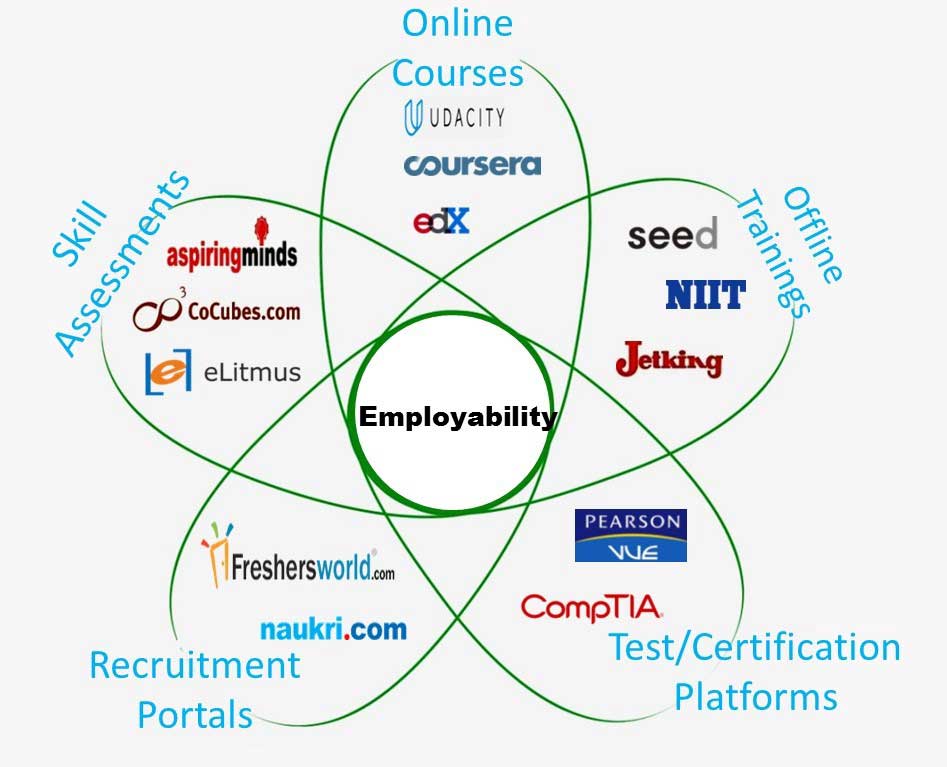What happens when a country is poised to have millions of workers in the age bracket of 20 to 24 years but only handfuls of them are employable?
Socio-economic inequality, slow growth of national economy and social unrest are some of the major consequences of such a situation. Clearly, if the demographic dividend of our country has to be exploited, we need an employable workforce.
Problem of Employability
Employability varies as per a particular demographic and job role. For example, employability of engineering undergraduates is determined by their skills on latest technologies whereas it would mean shop floor skills of a rural youth seeking a job in manufacturing sector. Consider this statistic- Out of 1.5 Million engineers passing out of various colleges in India only 3% are suitable to be employed in software or product market and only 7% in core engineering roles. Employability of undergraduates in India is a huge challenge to inclusive development especially because they are potential contributors to the future of our nation.
One of the most prominent reasons for this situation is the educational system that is not flexible enough to adopt rapidly changing industry trends into its curriculum. It has been designed to train large numbers of students through a standardized one-size-fits-all approach. Educational content is delivered top-down in a stipulated manner over a fixed duration. This results in a wide gap between what is needed to be employable and what is being taught in classrooms.
There is a crying need for education to be linked to employability. This can happen only if the process of learning is looked at as constant, practical and democratic.
Solutions Available In the Market
Skill or employability gaps caused by mainstream education are being fulfilled by several different education technology providers. Online education market is booming in India and is poised to double in size to $40 Billion in 2017. Skills assessment providers, Online courses, Offline training centers, Certification platforms and Recruitment portals are all attempting to address employability-related issues of college graduates and young professionals.

Comprehensive Approach to Employability
The problem of employability is a complex one. Employability of a college graduate is a combination of his technical skills required for jobs in the industry of his choice and behaviourial skills that include interpersonal communication, aptitude, logical reasoning and ability to work in a team. Further, a graduate also needs access to employers of his choice who can calibrate his skills against industry benchmarks.
Most players in the employability market are sharply focused on only one of the following aspects of employability- assessing skills, training, certification and placement assistance. However making graduates employable needs a holistic approach. It needs to connect the dots between all these aspects associated with employability under a single program.
1 Year to Be Fully Employable
Currently, many programs and courses available to students are compressed in a span of a month or few months. Most of them are focused on rapid learning and often ignore the role of softer skills which can only be imbibed through consistent training and conditioning over a period of time. Mock interviews, aptitude and CV preparation, personality development, group discussions and counseling by industry experts are chiefly instrumental in shaping a student’s confidence and ultimately his employability. The entire journey from being a fresher to an employable candidate needs a reasonable amount of time, mostly a year. The best time for a student to start his journey is in the pre-final year of graduation.
Innolat Technologies, a Raipur based education technology startup, takes 1 year to make an undergraduate fully employable or industry-ready. Innolat’s platform- iLrnn incorporates customized learning based on a student’s preferences and strengths, provides a mix of online and offline learning and offers an easy-to-use platform to find suitable jobs.
Increasingly, employers prefer candidates who are self-aware and are clear about what they can offer to their chosen industry. This creates a need for finishing schools that churn out industry-ready professionals who need minimal time to take on the rigours of their workplace. It is time to look at employability as a comprehensive job skills coaching. What’s your opinion?